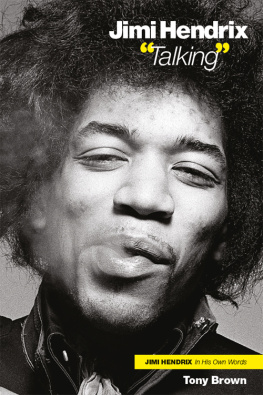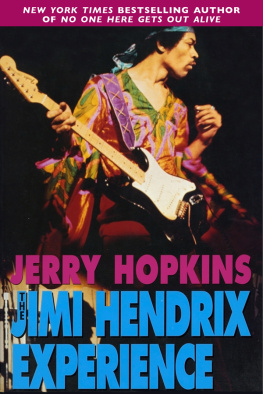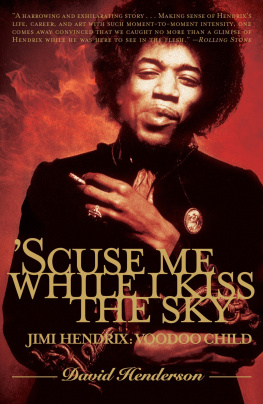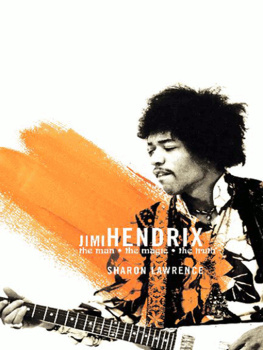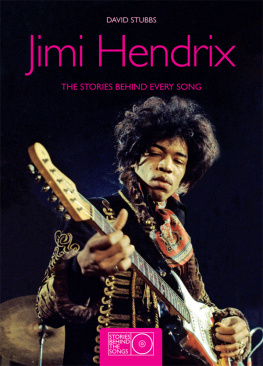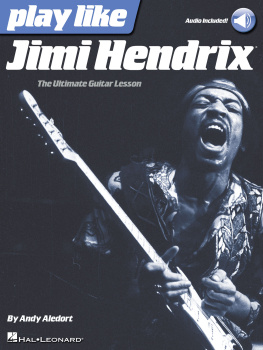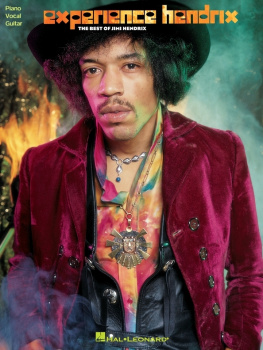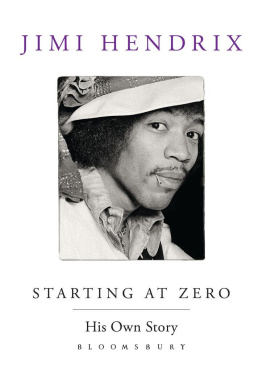My own music is in my head. If I dont get it together, nobody else will.
Jimi Hendrix was born on November 27, 1942. His starring role as the worlds most inventive rock guitarist lasted from September 1966 to September 18, 1970, the day of his tragic death in London.
On stage, Jimi Hendrixs performance was wild and extrovert, but off stage he was always unfailingly polite and shy, invariably willing to talk to anyone interested in what he had to say. Although Jimis career was short, he gave an immense amount of interviews, particularly during his first two years of fame. On many occasions he gave two interviews or more in a day.
Introduction
Some interviewers found it a daunting task talking to Jimi Hendrix for the first time. But his on-stage reputation belied his true character, and most were pleasantly surprised by his exemplary manners, unusual shyness and good humour. This was often reflected in the headlines of the articles that followed, with lines like Gentleman Jimi, Hendrix Hes A Beautiful Person or Mr Phenomenon.
Jimi was always very articulate and unafraid to express his views. Sometimes his conversation would flow like his extraordinary guitar solos, veering off at tangents and skirting around a subject before returning to the original theme. Jimi would never use an interview as a vehicle to express his dislike for anybody, and he almost always had a complimentary word to say about everyone, especially other musicians. Sometimes Jimi would become very philosophical when confronted with someone who could grasp his complex ideas. Other interviewers, those intimidated by his honesty, were not so fortunate.
Jimis trademark in interviews was the much over-used phrase You know. Anyone remotely familiar with his interviews will recognise this phrase as an essential part of Jimis style of personal expression, and it has been retained here. Without it, this book would not be Jimi Hendrix Talking.

Here are Jimis views about his life, his career, his music, his personal philosophy and his ideas for a future that unfortunately never came to pass. Its a great loss to us all that he is unable to continue to share his thoughts with us.
TONY BROWN, MARCH 1994

Politics & Style
Personal Philosophy
Well, lets see, personal philosophy? Well my personal one is that its part of my life, you know, its just a part of me; music itself. And the effect I would like to have for it on audiences, maybe in a hypnotic state, if not an awakening state, you know. So therefore, thats why we dont preach necessarily violence, unless its a certain incidence in a song. It should have some kind of solution, you know, at the end of a song; every song that we give out to the people, you know, cos its all its almost all philosophy, our music is most of it is in a very hazy form, because its still, its still progressing, you know. Its just like a little baby, and it hasnt even reached the stage that I call; for it to walk by itself, you know. BEVERLY HILLS, JUNE 1969
Riots
Well, sometimes when theres a lotta riots and so forth; thats still gonna happen in the States, you know, and anywhere else for that matter. So therefore, in the hottest parts of the country, they should allow these groups to play in an outdoor way, you know. I know that sounds suicidal, but its not at all; matter of fact its the best way to do anything. Is to bring only special groups though, certain groups; because theres a lot of groups thats trying to like I said before, keep harmony amongst people. So, they either give them good-time music or loud music, so they can release their frustrations and so forth. Standing right next You know, like black and white standing next to each other with hammers, getting ready to hit each other, and this music has a way its a universal language anyway, and if it was respected properly it would have a way to reach these people at the same time. And like, its a thing like I think it should be brought outside, almost like the Evangelists, you know, a gathering like that. The other music should stay in clubs and, you know All the pretentious people in the music, well they should just stay in their pretentious bag, like for instance in clubs and cabarets and all that. But see, theres a lot of elderly people wanna know about whats happening in the new music today too. They wanna know why people play so loud, you know, and they wanna know this and they wanna know that. Well its the best thing for them to do, is come and hear certain groups. Theres only certain groups that are trying to get across a harmony message anyway. And were one of em.
Racism
The race problem is something crazy. The black riots in American cities, that you can read so much about in the papers currently, are just as crazy. What they are doing is irresponsible. I think that we can also live quietly, side by side. With violence; a problem like that has never been solved. The race problem exists in Europe too. But they dont talk so much about it. BERLIN, SEPTEMBER 1967
I wish theyd had electric guitars in cotton fields back in the good old days. A whole lot of things would have been straightened out. Not just only for the black and white, but I mean for the cause!
Well, its so funny, because even some coloured people look at my music and say, Is that white or black? I say what do you want it you know, what are you trying to dissect that for? Try to go by the feeling of it. Just because its loud.

All those are things that we have to wipe away from the face of the earth, before it can live in harmony.
Everybody isnt a hang up though, cos, thats the human beings, just a bit dumb-sighted anyway, you know. Thats naturally just like how were gotta fight, you know; like being honest and all that. Thats human beings deep down inside, and then nobody can go around and see to all these little boys, you know, like Americas little boys, and, you know, all these the countries to me are like little kids playing with different toys. All of a sudden one little kid runs over to the other, you know, or a little bigger But see all these countries are still growing up, and pretty soon, you know and their children come around and do the same, you know. So its no big thing, you know, really, its no big problem, because thats human beings anyway, to fight and to compete against each other. NEW YORK, JANUARY 1968

JIMI POSES NEAR THE FIRST LONDON FLAT HE SHARED WITH MANAGER CHAS CHANDLER
Militant Groups
No man, listen. Everybody has wars within themselves, so you form all like you know, you form different things and it comes out to be war against other people and so forth and so on. But thats what that boils down to. I dont care if you go black or white militant, or Spanish for that matter. Let me say this is or say that.
NEW YORK, FEBRUARY 1970
Yeah, I naturally feel a part of what theyre doing, in certain respects, you know. But everybody has their own ways of saying things. They get justified as they justify others, you know; in their attempts to get personal freedom. Thats all it is. Yeah, Im still free, but not to no, you know, aggression or violence or whatever you want to call it. Im not for guerrilla warfare.
Next page
